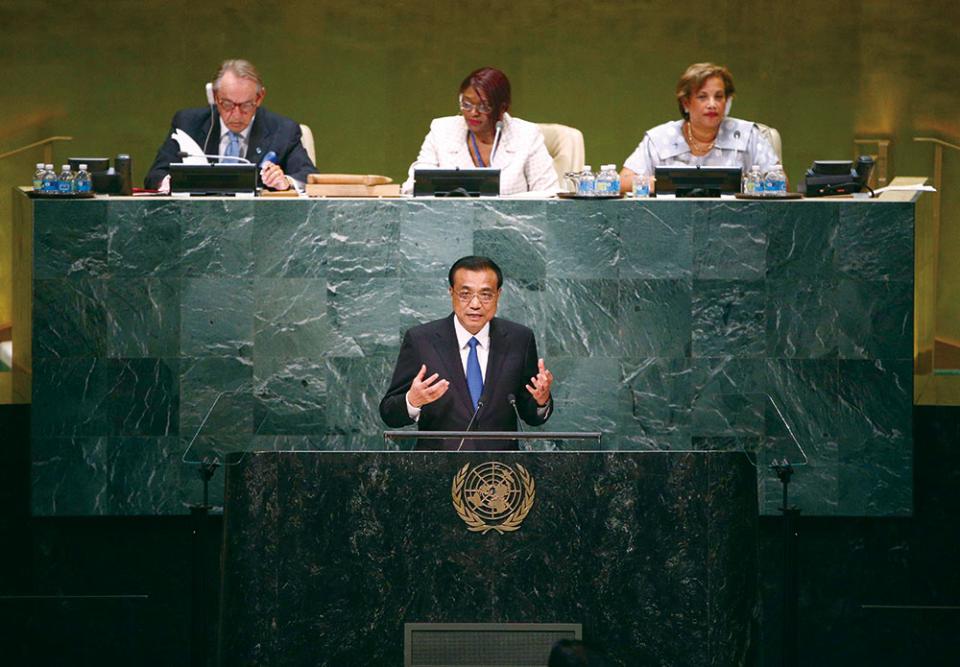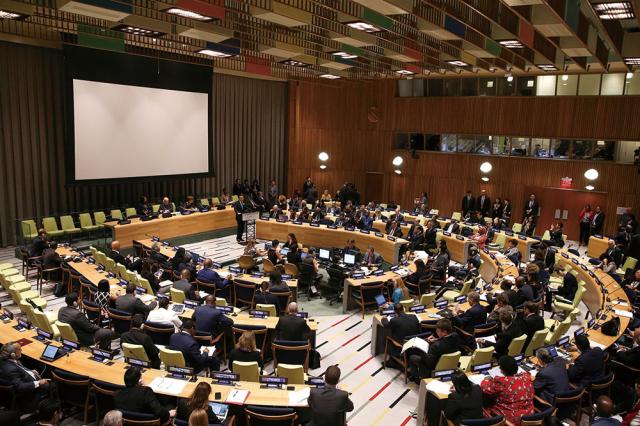On September 19, Chinese Premier Li Keqiang delivered a keynote speech at the 71st session of the UN General Assembly. In his UN debut, Li presented various proposals on various global challenges, laying out a newly proactive Chinese role within the UN.
In the 45 years since assuming its seat, China has been relatively cautious in its exercise of UN power, including exercising its veto a mere nine times, less than any other permanent member of the Security Council.
But Li’s speech presented a more potent role for China, including a focus on the 2030 Agenda for Sustainable Development, a UN-backed initiative launched at a summit last year that aims to eradicate extreme poverty worldwide by 2030.
China is a strong advocate of the 2030 Agenda. At the Sustainable Development Summit in 2015, Chinese President Xi Jinping pledged to provide US$2 billion in assistance for South-South cooperation (referring to the Global South, a common term for underdeveloped countries), and promised to increase China’s aid to the world’s least-developed nations to US$12 billion by 2030. Xi also pledged debt relief for the least-developed landlocked and island countries. In September 2016, China pushed G20 leaders to map out an action plan for the 2030 Agenda at the G20 Summit in Hangzhou, Zhejiang Province.
In his speech, Li said that China had already provided 400 billion yuan (US$60 billion) to 166 countries and over 30 international and regional and organizations, and has trained around 12 million personnel for other developing countries, in sectors ranging from security to healthcare. He emphasized that China was among the first countries to release a national plan on implementing the 2030 Agenda, and that it would increase its annual contributions to UN development agencies by another US$100 million by 2020 compared to 2015 levels.
In a follow-up speech at the Summit for Refugees and Migrants held on September 19, Li pledged another US$100 million in humanitarian aid to help tackle the global refugee crisis, directed toward international organizations and affected countries. Li added that China is considering setting aside a part of the China-UN Peace and Development Trust Fund, established last year with a pledge of US$1 billion, to support developing countries addressing issues around refugees and migrants. “We’re committed to shouldering responsibilities compatible with our abilities, and this is an act of justice,” Li told the assembled delegates.
Keeping the Peace In a sharp contrast with previous policy, China is also increasing its role in UN peacekeeping. The UN’s “Blue Berets” have become a familiar force in conflicts throughout the world, and in maintaining order in post-conflict zones. At last year’s UN General Assembly, Chinese President Xi Jinping announced that China would build a permanent peacekeeping squad, and will maintain a peacekeeping stand-by force of 8,000 troops. Xi also said that China would provide US$100 million to the African Union’s stand-by force, cementing China’s close ties to the continental group.
China has been historically reluctant to take part in peacekeeping operations, due to its long-standing non-intervention policy. For example, China abstained from voting on peacekeeping resolutions throughout the 1970s and 1980s, and later from those on the Rwandan genocide and conflicts in the former Yugoslavia.
But in the late 1990s, China started to gradually scale up its contribution to peacekeeping operations. At the same time, the US began dramatically cutting its role in UN peacekeeping, after 18 US soldiers were killed in Mogadishu, Somalia in 1993 when two Black Hawk helicopters were downed by rebels.
The result is that China has now become the top contributor of troops among the five permanent members of the UN Security Council and is the second largest financier of peacekeeping budgets as of July 2016, accounting for 10.3 percent of the UN peacekeeping budget. Around 3,000 Chinese peacekeepers were participating in 10 UN operations, including in South Sudan, Lebanon and Mali, as of October 2016.
With more commitment have come more casualties. In June and July 2016, three Chinese peacekeepers were killed in fighting in Mali, and another seven injured. At the UN Peacekeeping Ministerial Meeting held in London in early September, however, China reiterated support for peacekeeping despite these losses, and backed the quick deployment of peacekeepers, pledging to train and equip troops that can be deployed for peacekeeping within 60 days. China has also agreed to help construct the UN stand-by force of 8,000 peacekeepers.
On September 22, China’s Ministry of Public Security said that 160 Chinese policemen had passed a UN selection and assessment process with good grades, and were now expected to become part of the UN rapid deployment force.
Despite its more proactive role, China maintained that its peacekeeping remains in line with its traditional non-intervention approach and focus on multilateralism, since the UN is the most important and legitimate multilateral platform for global governance. In contrast to the US, which is more comfortable working with military alliances such as NATO, and often intervenes against the will of the nations involved, China maintains that UN-mandated operations, with the consent of the host nation, are the only path toward a sustainable peace.
Steps Forward
For many analysts, China’s high-profile pledges at the past two UN General Assemblies mark a major step forward in its approach to the body.
Since the 1971 UN General Assembly Resolution 2758 “restored the lawful rights” of the People’s Republic of China, marking international acceptance of the PRC, the UN has been a cornerstone of China’s diplomatic strategy.
But for the first couple of decades after taking its seat, China took a passive approach in the UN. “For ideological reasons, China mostly considered the UN a platform to rally other developing countries in protesting against ‘hegemony,’ and only selectively participated in other UN affairs,” argued Shi Chenjia, a researcher with the Shanghai Institutes for International Studies, in a commentary published in
thepaper.cn. “As a result, the UN only played a peripheral role in China’s diplomatic landscape.”
But as China moved toward the global spotlight, it began to adopt a more proactive approach toward the UN, beginning with initiatives led by former president Hu Jintao in the 2000s. “The UN is now moving from the periphery to the very center in China’s overall foreign policy, becoming the foundation and core of its multilateral diplomacy,” wrote Shi.
Yet China has remained focused on peace and development. Li emphasized in his speech that the lifting of tens of millions of Chinese people out of poverty played a major part in the partial achievement of the UN’s Millennium Development Goals (MDG), a previous set of targets that failed to be fully achieved.
“China is a major developing country with a population of 1.3 billion people. Managing its own affairs well is its biggest contribution to peace and development in the world. Meanwhile, China also works in earnest to fulfill its international obligations,” said Li.
Shi wrote that one of the major parts of China’s UN diplomacy is to bring about convergence between China’s own interests and its international obligations. Since the current Chinese leadership assumed power in 2013, China has launched a number of global development initiatives such as One Belt, One Road and the Asian Infrastructure and Investment Bank, while promoting the concepts of “shared prosperity” and “common destiny.”
China hopes that linking its own development agenda to the UN can provide an international framework for its achievements, sustaining its own economic development while bolstering its reputation and securing a more critical role in global governance. By strengthening its support to the UN, China also aims to push forward its previously mooted reforms of global governance, while mitigating its strategic rivalries with the US and regional powers like India.
For example, in his UN speech, Li urged member states to support the UN’s leading role in international affairs. He also called for countries to support reformed global governance mechanisms that “reflect the changed international landscape,” and to join in a global partnership that put dialogue above confrontation.
As the cooperation between China and the UN has yet to be fully unveiled, the impact China’s new approach to the UN will have on the world has yet to be seen.

 Old Version
Old Version

